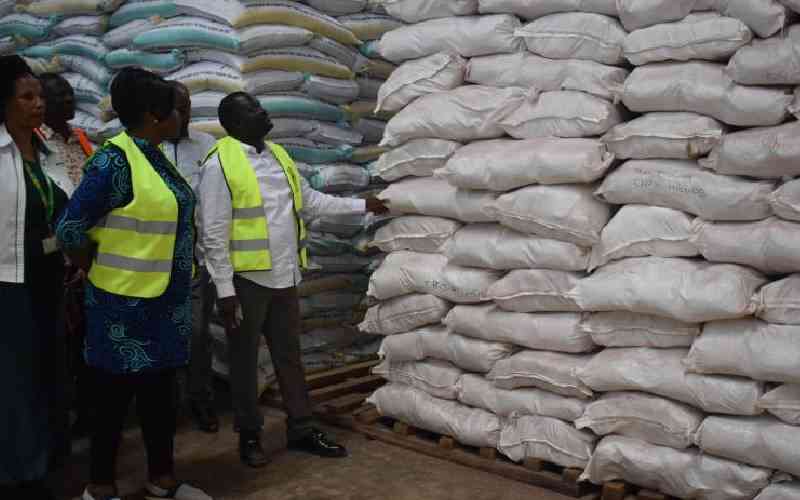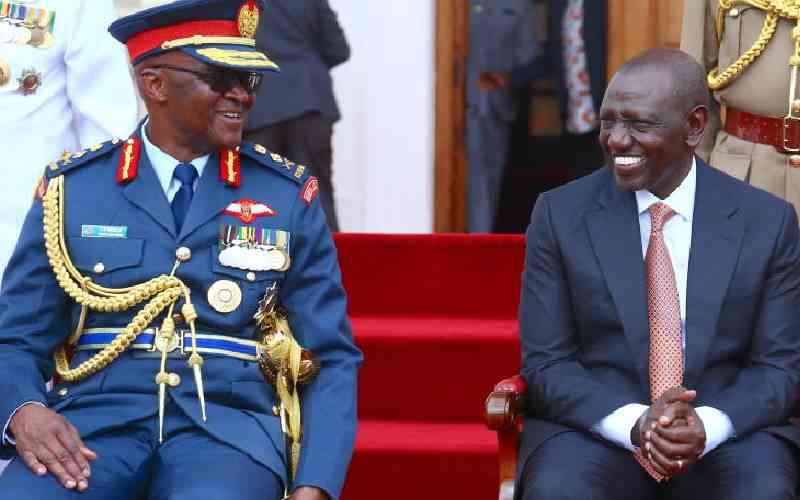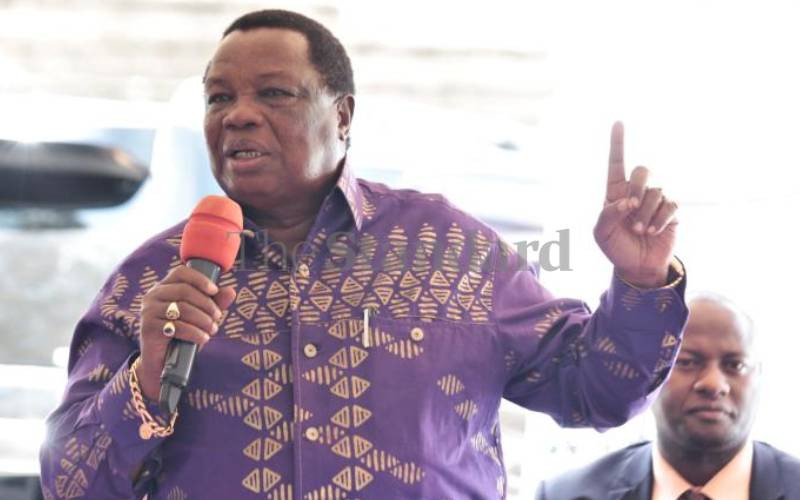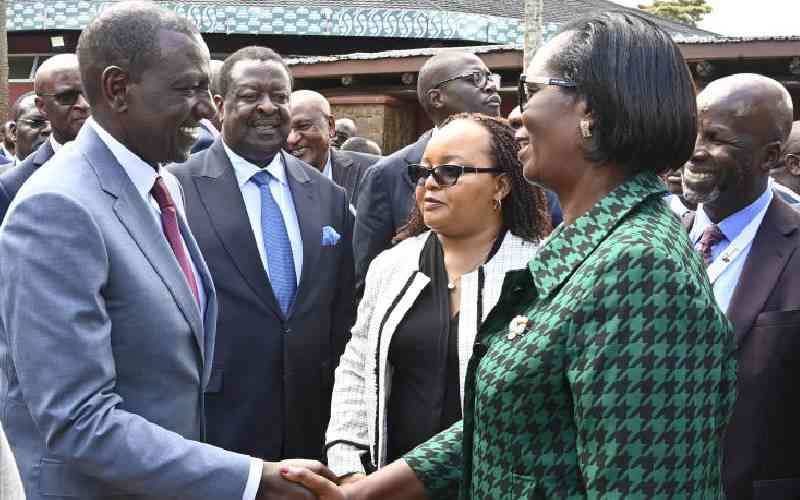By PETER OPIYO and ALEX NDEGWA
Transport Minister Amos Kimunya is again faced with a parliamentary probe with the potential of forcing him to step aside for the second time until cleared.
Also tied to him on the hip in this latest Sh1.8 billion De La Rue money printing payment query, just like was the case with the controversial sale of Grand Regency Hotel to the Libyan government, is Central Bank Governor Njuguna Ndung’u.
The MPs also want the minister who recently was on the dock in Parliament over highly tribalised appointments at the board of Kenya Ports Authority surcharged.
Kimunya, who is no stranger to controversies in his Cabinet portfolio, starting off with his 2003 declaration as Lands minister that title deeds were mere pieces of paper, is on a spot over claims he facilitated suspect money printing deals through which the taxpayer lost Sh1.8 billion. Parliament’s top watchdog — Public Accounts Committee (PAC) — has also recommended that the Ethics and Anti-Corruption Commission (EACC) investigate Kimunya and Ndung’u over the cancellation in 2006 of a cheaper long term contract in favour of expensive single-sourced multiple interim orders to print Kenyan currency.
PAC recommended their removal from office saying they are “not fit to hold public office” following their conduct in the deal.
PAC also called for the termination of the appointment of Ndung’u and a tribunal set up by the President to investigate his conduct over the deal for the supply of 1.71 billion pieces of banknotes.
Ndung’u was, however, not the Governor when the deal was signed between CBK and De La Rue. “The Ethics and Anti-Corruption Commission should investigate the former Minister for Finance Amos Kimunya over his conduct in the loss of Sh1.8 billion with a view of taking appropriate legal action against him and recovering lost funds,” the report recommends.
Treasury portfolio
The team led by Ikolomani MP Dr Boni Khalwale found out that both Kimunya and Prof Ndung’u are responsible for the loss of the money and acted in contravention of the Constitution and the Public Procurement and Disposal Act.
The probe rekindles the dramatic duel in Parliament between Kimunya and Khalwale in July 2008, which led to his stepping aside and, when reinstated, he lost the Treasury portfolio.
Kimunya has further been involved in controversy over the appointment of the Kenya Airports Authority MD and later the constitution of its board.
In the latest saga, the Committee was probing the printing contracts between Central Bank of Kenya and De La Rue Company from which a joint venture agreement for acquisition of 40 per cent stake in the Company’s Ruaraka, Nairobi plant by the Government of Kenya was conceived.
In its conclusion it has blamed the two for the controversial tender and recommended that appropriate legal action be taken against Kimunya and Prof Ndung’u with a view of recovering the lost funds.
“Kimunya and Ndung’u having been responsible for the loss of Sh1.8 billion and acted contrary to the provisions of Chapter Six of the Constitution of Kenya, the Public Officer Ethics Act and the Public Procurement and Disposal Act and in that respect, they are unfit to hold public office,” recommends PAC’s report tabled in Parliament.
Stay informed. Subscribe to our newsletter
Banknote
Since 2003 after the National Rainbow Coalition government took power, CBK had been procuring banknotes from De La Rue on interim orders without subjecting them to a competitive procurement process, contrary to Government procurement regulations and procedures.
The Committee puts Kimunya on the spot for failing to grant then Deputy Governor of CBK Jacinta Mwatela permission to sign banknote designs in the absence of former Governor Andrew Mulei.
“This was another case of infringement on the independence of CBK by Treasury. The banknote printing contract was between CBK and De La Rue Company and De La Rue ought to have obtained instructions on signatures from its client, CBK, and not the Minister for Finance,” states the report.
Trouble for the two can be traced to the cancellation in 2006 of a competitive international tender for printing 1.71 billion pieces of banknotes.
The tender was awarded to De La Rue Company, which was to print the notes from its plant in Malta and ship them to Kenya at a cost of $51 million (Sh3.7 billion).
De La Rue won the bid by quoting prices that were three times cheaper than what the firm had been charging the government under a 2002 10-year deal entered with the Kanu regime.
On May 4, 2006, CBK and De La Rue signed the contract for printing smaller-sized new generation banknotes with advanced security features.
But Kimunya directed CBK to cancel the deal in November 2007 citing the Government’s intentions to go into a joint venture with De La Rue.
Curiously, both parties mutually agreed to revoke the agreement and De La Rue even undertook not to claim damages for breach of contract.
Apparently the firm did not contest the cancellation because it meant the Kenyan Government would revert to procuring currency through expensive interim orders on the old terms of the 2002 deal, like it had done since 2003. Therefore since October 2006, when the contract for printing 1.71 billion banknotes was awarded, CBK has procured from De La Rue Company four interim orders of banknotes through single sourcing.
The “stop gap” contracts for the minting of 1.4 billion notes cost the taxpayer Sh5.5 billion. This is higher than Sh3.7 billion which would have been spent on the supply of even more currency — 1.71 billion pieces of bank notes — had the 2006 contract been implemented.
Cheap contract
PAC concluded the taxpayers had lost Sh1.8 billion through the costlier interim orders.
“The Committee is also satisfied that De La Rue Company was overcharging CBK on the interim orders since when subjected to a competitive procurement process, it charged less hence the price difference,” says the report.
PAC accused Kimunya of ordering the cancellation of the cheap contract yet his ministry was not even party to the contract. The committee dismissed as “invalid” all the reasons he gave for the cancellation.
Ndung’u, on the other hand, said PAC, did not make any effort to resist the directive to cancel the contract. In so doing, the MPs observed, he failed to protect the bank’s independence and taxpayers’ interest.
During one of the committee hearings, Khalwale told Ndung’u that Mwatela was edged out of CBK because she opposed the deal.
“They removed Mwatela and put you there and you have been playing ball,” Khalwale charged.
“You are wrong,” Ndung’u then replied, explaining that the role of CBK Governor is spelt out in law, and the holder is independent.
Mwatela was ignored when she advocated for implementation of the 2006 contract, arguing the short-term contracts favoured De La Rue.
Evidence before the committee further suggested preparations for the international competitive tender, floated in 2006, may have cost the Treasury Sh300 million, including expenses to host a high profile delegation of African consultants. This would raise the net loss from the costly “stop gap” contracts, which Ndung’u defended as meant to save 260 jobs at De La Rue, to Sh2.1 billion.
Though the Committee agreed with the Government’s decision to enter into a joint venture with the firm, it noted some anomalies in the joint-venture agreement.
 The Standard Group Plc is a
multi-media organization with investments in media platforms spanning newspaper
print operations, television, radio broadcasting, digital and online services. The
Standard Group is recognized as a leading multi-media house in Kenya with a key
influence in matters of national and international interest.
The Standard Group Plc is a
multi-media organization with investments in media platforms spanning newspaper
print operations, television, radio broadcasting, digital and online services. The
Standard Group is recognized as a leading multi-media house in Kenya with a key
influence in matters of national and international interest.
 The Standard Group Plc is a
multi-media organization with investments in media platforms spanning newspaper
print operations, television, radio broadcasting, digital and online services. The
Standard Group is recognized as a leading multi-media house in Kenya with a key
influence in matters of national and international interest.
The Standard Group Plc is a
multi-media organization with investments in media platforms spanning newspaper
print operations, television, radio broadcasting, digital and online services. The
Standard Group is recognized as a leading multi-media house in Kenya with a key
influence in matters of national and international interest.








